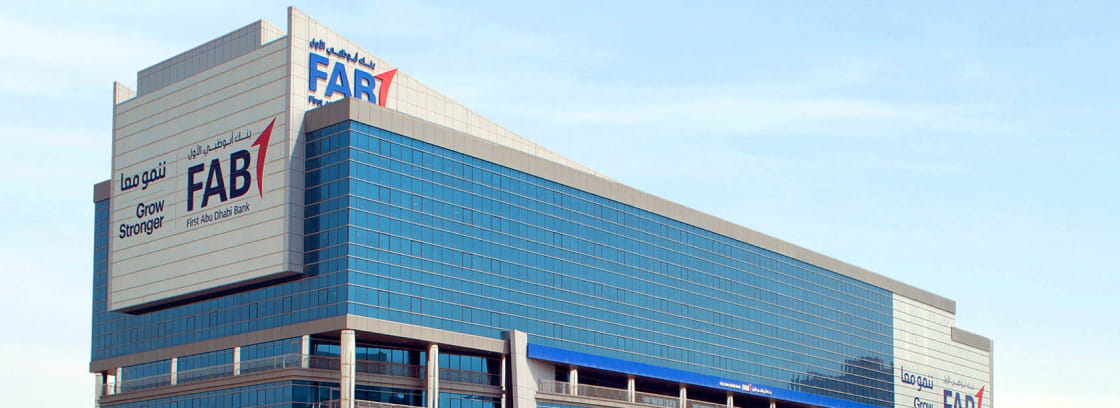
Nine months 2020 net profit at AED 7.3 Billion
Abu Dhabi, 26 October 2020: First Abu Dhabi Bank (FAB), the UAE’s largest bank and one of the world’s largest and safest financial institutions, reported its financial results for the nine-month period ended 30 September 2020, today.
Following a resilient first, the bank delivered solid results in the third quarter of 2020, reflecting a rebound in economic activity, a healthy business momentum across Corporate and Investment Banking (CIB) and Personal Banking (PBG), and effective management actions in response to the current environment. Group net profit for the third quarter of 2020 was AED 2.5 Billion, a 4% increase from the second quarter. Net profit for the first nine months of 2020 was AED 7.3 Billion, 22% lower compared to the same period in 2019, mainly due to higher impairment charges and softer revenue, partly mitigated by cost optimisation. The Bank continued to demonstrate balance sheet strength through improved liquidity, funding, and capital ratios. Asset quality remained resilient underpinned by diligent risk management and a conservative risk profile, supported by the relief measures under the UAE Central Bank TESS programme.

André Sayegh
Group Chief Executive Officer
“FAB delivered a resilient performance in the first nine months of 2020, successfully managing key risks in the face of unprecedented economic and market conditions. With total assets almost reaching the AED 1 Trillion mark as of September-end 2020, our robust foundation enabled us to continue to support our clients,
“FAB delivered a resilient performance in the first nine months of 2020, successfully managing key risks in the face of unprecedented economic and market conditions. With total assets almost reaching the AED 1 Trillion mark as of September-end 2020, our robust foundation enabled us to continue to support our clients, and to benefit from the gradual rebound in economic activity and market sentiment. Leveraging our competitive strengths, we were proud to lead prominent transactions for our clients in the third quarter, and to continue to support trade and investment flows across the region.
We continued to accelerate our digital initiatives across the Group. A specific focus was enhancing our customer facing channels, finalising key digitally-led partnerships, and enhancements in payments and merchant services. Our new partnership with ADQ and its future digital bank also represents a new milestone for us, as part of our commitment to support Abu Dhabi’s digital ambitions. Internally, our digital-first mind-set has allowed us to adopt flexible working policies at FAB and we will continue to look into how we can evolve our operations to best meet our stakeholders’ needs.
I am proud of our achievements so far this year, as we continued to demonstrate resilience, while making significant progress against our strategic agenda, and supporting the government’s important relief and stimulus measures. In recognition for our strong profile, we were once again ranked as the Middle East’s Safest Bank by Global Finance, and improved on our ranking as the 16th Safest Commercial Bank globally from 22nd last year. The publication also named us the “Best Bank in the UAE” and we were honoured as the “Investment Bank of the Year for Emerging Markets in the Middle East” by the Banker, amongst a number of other prominent accolades.
I would like to thank all our partners and stakeholders for their continuous support. We are grateful for the guidance received by the UAE’s leadership, our chairman H.H. Sheikh Tahnoon Bin Zayed Al Nahyan and our board members and senior management team. I also want to thank our customers and shareholders for their trust in us, and our employees for putting the customer first and working flexibly to maintain a seamless service. Looking ahead, we will continue to play a key role in supporting the UAE’s economic recovery, and we remain confident in our ability to navigate the evolving environment, and to deliver sustainable shareholder returns.”

James Burdett
Group Chief Executive Officer
“The Group delivered a net profit of AED 2.5 Billion in the third quarter of 2020, up 4% sequentially, marking our strongest quarterly performance this year. While we continued to face headwinds from low interest rates and the challenging environment brought about by the ongoing pandemic, this was offset by
“The Group delivered a net profit of AED 2.5 Billion in the third quarter of 2020, up 4% sequentially, marking our strongest quarterly performance this year. While we continued to face headwinds from low interest rates and the challenging environment brought about by the ongoing pandemic, this was offset by higher fee-based income reflecting a rebound in business activity with sales volumes in PBG returning to pre-COVID levels, and strong results from our continued focus on cross-sell and revenue diversification. Our CIB business performed particularly well with underlying revenue growth underpinned by the execution of landmark deals for our core clients in the UAE and MENA, as well as strong client engagement across our franchise driving higher income from Global Market sales. Reflecting strong cost discipline, operating expenses improved 7% year-on-year amidst ongoing investments in key strategic and digital initiatives designed to enhance productivity and create future efficiencies. While we continued to build prudent provisions against our portfolio, we benefitted from the partial resolution of a large corporate account which resulted in lower impairment charges sequentially. With a CET1 ratio at 14.0%, our capital position is strong and comfortably above regulatory requirements.”
Key operational updates
As we moved into the third quarter, FAB continued to support employees, customers and the UAE community to mitigate the effects of the COVID-19 pandemic, and a particular focus was dedicated to supporting SMEs as they navigate challenging times. Relief measures extended to our retail, SME and corporate customers in the form of payment deferrals under the Targeted Economic Support Scheme (TESS) were AED 7.5 Billion as of September-end 2020. In addition to TESS, FAB continued to provide relief to customers through its own programmes.
The Bank also accelerated the execution of its digital plans, adapting to new market realities, while unlocking long-term value for our customers, shareholders and communities. We continued to automate key processes, and enhance digital capabilities, with further innovation in the payments sphere including the launch of ‘Digital Marketplace’ through Payit, which allows SME businesses to list and sell their products and services on the platform; a partnership with UAE-based Fintech start-up Tabby to enable acceptance of their Buy-Now-Pay-Later solution at FAB merchant partners; and an agreement with the Ministry of Human Resources and Emiratisation (MOHRE) to launch a unified payment solution for domestic workers.
FAB continues to have a robust Business Continuity & Crisis Management framework in place, and the Bank now sees some 90% of FAB UAE staff and 65% of international staff enabled to Work From Home (WFH). Our Return to Office programme is in progress based on a phased approach. We have invested extensively in people, process and technology, with continuous management support to prioritise Information Security, and maintain robust operational resilience.
We will continue to invest in our infrastructure to build a world-class technology foundation, a key enabler to support an agile operating model and achieve our business aspirations.
